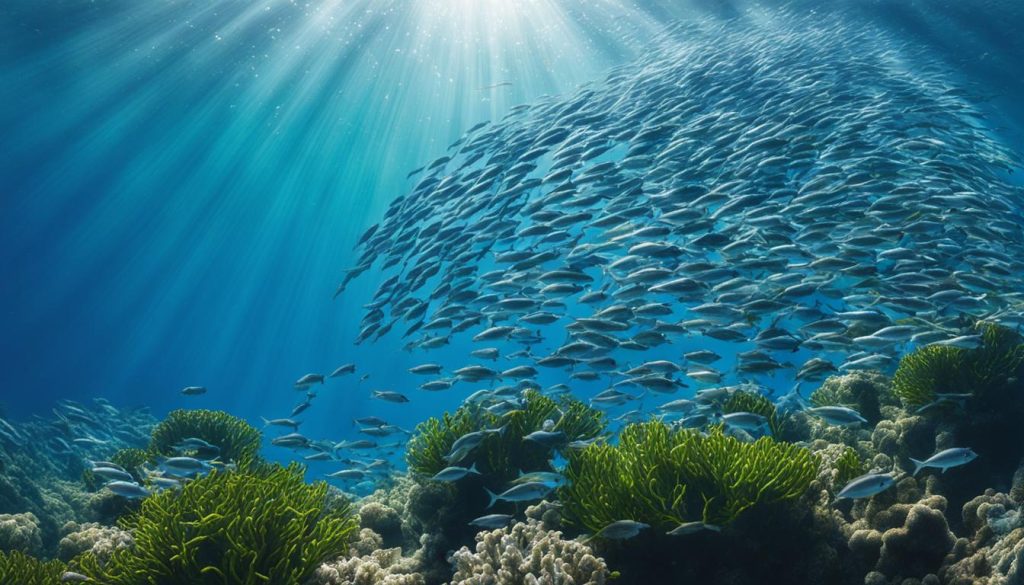Not all fish are created equal when it comes to your health. While fish is generally considered a nutritious food, certain species can pose risks due to high levels of mercury, pollutants, and other contaminants. In this article, I will reveal the top 5 fish that you should never eat to protect your well-being.
When it comes to choosing seafood, it’s important to be aware of the potential health hazards that some fish may carry. Consuming unhealthy fish can lead to adverse health effects, including mercury poisoning and exposure to excessive pollutants. Hence, let’s look deeper on the fish you should never eat.
Fish You Should Never Eat Unveiled
- Stay away from fish that have high mercury levels, as it can be harmful to your health.
- Avoid consuming fish with excessive pollutants to minimize toxic exposure.
- Be cautious of fish species that are known to be unsafe for consumption.
- Make informed choices when it comes to selecting seafood to avoid the worst fish for your health.
- Steer clear of contaminated fish species and opt for healthier seafood options.
The Worst Fish for Your Health
Not all fish are created equal when it comes to their impact on your health. Some fish should be avoided due to their high levels of contaminants, sodium, mercury, and overharvesting issues. These fish can pose serious risks to your well-being and should be avoided:
Fish High in Contaminants
- Shark
- King mackerel
- Tilefish
Fish with High Sodium Levels
- Anchovies
- Canned tuna
- Smoked salmon
Fish with High Mercury Levels
- Swordfish
- Marlin
- Bigeye tuna
Fish with Overharvesting Issues
- Atlantic cod
- Atlantic halibut
- Chilean sea bass
Fish to Avoid During Pregnancy
- Raw fish and shellfish
- King mackerel
- Swordfish
Fish with Declining Populations
- Bluefin tuna
- Atlantic salmon
- European eel
These are the fish you should never eat and have been identified as the worst options for your health due to various reasons such as high contamination levels, overfishing, and adverse effects during pregnancy. It is important to prioritize your well-being by avoiding these fish and opting for healthier alternatives with lower levels of contaminants and sustainable sourcing.
The Best Fish for Your Health
When it comes to choosing fish for your health, it’s important to select options that offer the most nutritional benefits. Incorporating fish into your diet can provide various advantages, including high levels of omega-3 fatty acids, essential nutrients, and potential cardiovascular benefits. As there are fish you should never eat, here are some of the best fish to prioritize for your overall well-being:
- Salmon: This fatty fish is a fantastic choice due to its rich omega-3 content. It not only supports cardiovascular health but also provides anti-inflammatory properties.
- Mackerel: Mackerel is another excellent source of omega-3 fatty acids, which are essential for brain health and reducing inflammation in the body.
- Tuna: Tuna is high in protein and omega-3s, making it a great option for those looking to maintain or develop muscle mass while reaping the benefits of these essential fats.
- Sardines: These small, oily fish are packed with omega-3s, calcium, and vitamin D, contributing to healthy bones and immune function.
- Trout: Trout is not only rich in omega-3 fatty acids but also a great source of protein. It offers a variety of vitamins and minerals that support overall health.
Incorporating these fish into your diet can help you maintain a well-balanced and healthy lifestyle. Try experimenting with different recipes and cooking methods to enjoy the diverse flavors and benefits they offer.

Dangers of Eating Fish: Environmental and Health Concerns
Eating fish can come with both environmental and health risks that should not be ignored. That’s why it is important for you to know the fish you should never eat. The consumption of certain fish species can expose us to various dangers that can have detrimental effects on our well-being. Some of the key concerns associated with eating fish include:
- Health risks of fish consumption: Fish can contain toxins, pollutants, and contaminants that can negatively impact our health. These substances may be present due to pollution in the oceans and water bodies where fish live. Consumption of contaminated fish can lead to various health consequences, including long-term health effects.
- Health consequences of mercury exposure: Mercury is a highly toxic metal that is found in certain fish species, primarily through environmental pollution. When we consume fish with high levels of mercury, it can accumulate in our bodies over time and pose serious health risks, especially for pregnant women, nursing mothers, and young children.
- Overfishing concerns: Overfishing refers to the depletion of fish populations beyond sustainable levels. It not only disrupts the balance of marine ecosystems but also threatens the livelihoods of those who depend on fishing. The overconsumption of popular fish species can contribute to overfishing, leading to the decline of fish populations and ecological imbalances.
- Pollution in seafood: Seafood can be exposed to a range of pollutants, including heavy metals, PCBs, pesticides, and microplastics. These pollutants find their way into the sea through industrial and agricultural activities, resulting in contaminated seafood. Consumption of polluted fish can have adverse effects on our health, such as impairing organ function, causing hormonal imbalances, and increasing the risk of certain diseases.
- Contaminated fish species: Some fish species are more prone to contamination than others due to their feeding habits, habitat, and life cycle. These contaminated fish species may accumulate higher levels of mercury, pollutants, or toxins. It is important to be aware of these species and avoid consuming them to minimize exposure to harmful substances.
Considering these dangers, it is crucial to make informed choices about the fish we should never eat and about the ones we should. By being aware of the risks and opting for fish that are low in contaminants and sustainably sourced, we can prioritize our health and contribute to the preservation of our oceans. Remember to consult with healthcare professionals and stay updated on dietary guidelines to ensure a balance between the benefits and risks of fish consumption.

The Healthiest Fish to Eat and Fish You Should Never Eat
To make the healthiest choices when it comes to consuming fish, it is essential to know which fish to eat and which fish you should never eat. Consider the following lists as a guide to help you make informed seafood choices:
Healthiest Fish to Eat
- Fatty fish such as salmon, trout, and sardines are excellent choices. They are rich in omega-3 fatty acids, which are essential for brain health and reducing the risk of heart disease.
- Mackerel is another healthy fish option that is packed with omega-3s.
- Halibut and cod are lean fish that provide high-quality protein and are low in saturated fat.
- Tuna is a popular seafood choice that offers a good balance of omega-3s and protein. However, it’s important to opt for skipjack or light tuna over albacore, which tends to have higher mercury levels.
- Herring is a nutritious fish that is particularly high in omega-3 fatty acids.
These fish not only provide essential nutrients but are also considered sustainable choices, as their populations are generally well-managed.
Fish You Should Never Eat
- Shark, king mackerel, swordfish, and tilefish are among the fish with high mercury levels, making them best to avoid, especially for pregnant women, nursing mothers, and young children.
- Imported shrimp and farmed salmon often have higher levels of pollutants and are considered less healthy options.
- Bluefin tuna, while prized for its flavor, tends to have higher mercury levels and is overfished, making it a fish to avoid or consume in moderation.
- To protect your health, it’s important to be mindful of fish that may have been exposed to pollutants or are not sustainably sourced.
Remember to consult with a healthcare professional to better understand your dietary needs and any individual health considerations.
Conclusion
Making informed seafood choices is crucial for maintaining good health and protecting the environment. The health risks associated with certain fish species highlight the importance of understanding which fish are healthy and which fish you should never eat. By choosing the right fish options, you can prioritize your well-being and contribute to sustainable fishing practices.
When selecting fish for consumption, it’s essential to be aware of the potential contaminants, such as high mercury levels or pollutants, that some fish may contain. Avoiding fish that are overfished or poorly managed is also key to ensuring the long-term sustainability of our oceans. By making informed decisions, you can support healthier fish populations and minimize environmental damage.
Consulting with a healthcare professional is always advised, especially if you have specific dietary needs or health considerations. They can provide personalized guidance and recommendations based on your individual circumstances. By incorporating their expert advice into your decision-making process, you can make the best seafood choices to support your overall health and well-being.
Being aware of the health risks associated with certain fish species and making informed seafood choices is crucial. By selecting the healthiest fish options and avoiding those with potential contaminants and overfishing issues, you can enjoy the benefits of fish consumption while safeguarding your health and the environment. Remember, it’s up to each of us to make responsible choices that promote sustainability and good health.
FAQ
What are the health risks of eating fish?
Eating fish can pose both environmental and health concerns. Overfishing, pollution, and the presence of contaminants like mercury can have negative consequences for your health.
Which fish should I avoid for health reasons?
The fish you should avoid for health reasons include those with high levels of contaminants, sodium, mercury, and overharvesting issues. It is best to stay away from these fish for the sake of your well-being.
What are the dangers of eating fish?
Some of the dangers of eating fish include exposure to toxins and contaminants, health consequences of mercury exposure, overfishing concerns, and pollution in seafood. It is important to be aware of these potential risks.
What are the healthiest fish to eat?
The healthiest fish options include those high in omega-3 fatty acids, which support cardiovascular and brain health, as well as other essential nutrients. These fish can provide numerous health benefits.
Which fish should I avoid consuming?
It is best to avoid fish with high levels of contaminants, overharvesting issues, and declining populations. These fish may pose health risks and can contribute to environmental problems.
How can I make informed seafood choices?
By staying informed about fish species that are healthy to eat and those to avoid, you can make better seafood choices. Prioritizing the consumption of fish with low mercury levels and supporting sustainable fishing practices is key.




